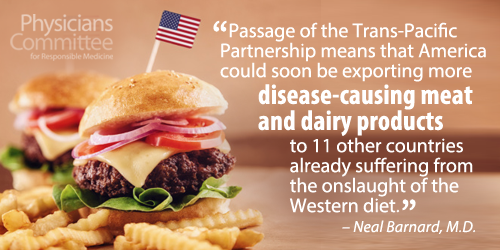Trans-Pacific Partnership: Exporting U.S. Meat, Dairy, and Disease

America could soon be exporting more disease-causing meat and dairy products to Mexico, Japan, and several other countries already suffering from the onslaught of the Western diet.
Negotiations on the Trans-Pacific Partnership—a trade agreement between 12 nations—ended earlier this week. The likely passage of the agreement means that America could soon be exporting more disease-causing meat and dairy products to Mexico, Japan, and several other countries already suffering from the onslaught of the Western diet.
The meat industry is already applauding its opportunity to dump beef, pork, and chicken on other countries—as the United States considers advising Americans to eat less meat.
The North American Meat Institute says “the agreement holds enormous potential for American meat exports.” The National Chicken Council says that the agreement “represents a significant opportunity to expand U.S. chicken exports.” The National Pork Producers Council noted that the agreement would “ensure substantial new market access benefits for U.S. pork in those markets.”
The agreement could also foist thousands of tons of U.S. dairy products on Japan. The country will accept up to 60,000 tons of powdered skim milk and butter from the United States in the first year of the agreement and 70,000 tons after six years of the agreement.
What does this mean for the health of the partner countries? It means more obesity, diabetes, heart disease, and cancer for countries already burdened with chronic disease. Mexico leads the world in childhood obesity. And a recent study in the Journal of the American College of Cardiology found that cardiovascular disease deaths in Japan have increased and the prevalence of risk factors is expected to increase.
What is the Physicians Committee doing to address the problem? We looked at the ramifications of meat and dairy exports in Good Medicine magazine a few years ago. And our experts are already working in China and India to warn people about the dangers of meat and dairy products and to promote plant-based disease prevention.
Earlier this year, Kickstart China program specialist Jia Xu, Ph.D., visited 28 cities in China, where he spoke to nearly 9,000 people and handed out Vegetarian Starter Kits in Mandarin at hospitals, hotels, yoga studios, festivals, corporations, restaurants, and schools, among other locations. Zeeshan Ali, Ph.D., Kickstart India program specialist, went to India where he gave presentations in Bhopal, Chennai, Delhi, Mumbai, Hyderabad, and Bangalore.
We also have resources on the benefits of a plant-based diet available in Spanish, Japanese, Hindi, and Mandarin.
The Trans-Pacific Partnership may be shipping more deadly U.S. meat and dairy products across the globe, but that doesn’t mean other countries have to pay the health consequences.






